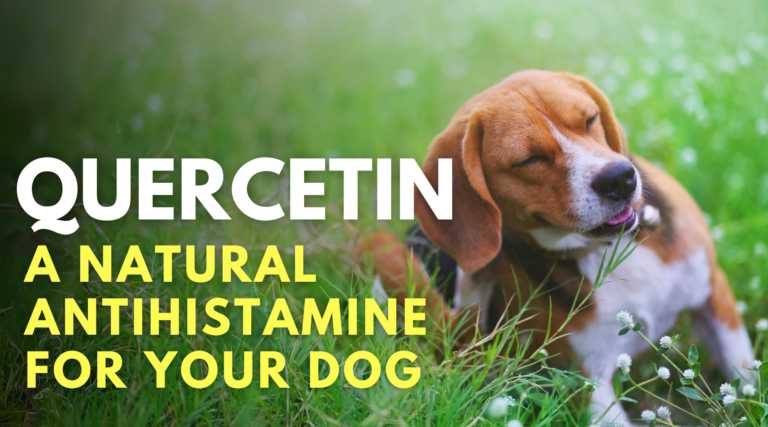Quercetin, a naturally occurring flavonoid discovered in lots of fruits, greens, leaves, and grains, has attracted vital consideration for its potential well being advantages and therapeutic potential in each animal fashions and people.
Dietary Sources and Bioavailability
Quercetin is in meals like berries and apples that are notably wealthy sources.
Nevertheless, its bioavailability is influenced by the shape by which it is consumed, this is the reason we’ve chosen fermented quercetin in JointButter®. The fermentation course of makes the lively substances stronger.
How does quercetin work and is it secure for canines?
A research by Moon, Wang, DiCenzo, & Morris (2008).[1] and Graefe, Derendorf, & Veit (1999).[2] has shown that quercetin’s bioavailability in humans is relatively low, suggesting that dietary intake or supplementation needs careful consideration to achieve therapeutic effects.
Concerning safety, Harwood et al. (2007) provided a comprehensive review, arguing that quercetin is safe with no evidence of in vivo toxicity or carcinogenic properties.[3] at consumption levels achievable through diet or supplementation.
What are the Health Benefits of Quercetin?
Anti-inflammatory and Immune Function
Quercetin’s anti-inflammatory and immunomodulatory effects are well-documented. Davis, Murphy, & Carmichael (2009)[4] and Konrad & Nieman (2015)[5] mentioned its potential to reinforce bodily efficiency and cut back sickness by modulating immune perform. These advantages are notably notable within the context of exercise-induced stress, suggesting quercetin’s position in supporting restoration and in addition decreasing susceptibility to respiratory infections.
Quercetin has Antioxidant Properties
The antioxidant properties of quercetin, as reviewed by Younger et al (1999)[6], contributes to its protecting results towards oxidative stress, doubtlessly decreasing the danger of continual illnesses, together with cardiovascular illnesses and most cancers.
Anticancer Potential is Promising
Rauf et al. (2018).[7] and Niedzwiecki et al. (2016).[8] explored quercetin’s anticancer efficacy, highlighting its potential to modulate varied signaling pathways concerned in most cancers development. The flavonoid’s position in regulating the expression of genes associated to most cancers cell survival, progress, and metastasis underscores its potential as a complementary remedy in most cancers therapy.
Cardiovascular Well being
One research by Jia. (2019).[9] demonstrated quercetin’s protecting results towards atherosclerosis by influencing the markers associated to lipid metabolism and ldl cholesterol regulation. These findings recommend quercetin may very well be a useful dietary part in preventing cardiovascular diseases.
Is quercetin good for canines and other people?
Based mostly on obtainable analysis, quercetin is a sexy ingredient for superior dietary dietary supplements offering wide-ranging well being advantages, together with anti-inflammatory, immuno-modulatory, antioxidant, and anti-cancer properties.
References
- Moon, Y. J., Wang, L., DiCenzo, R., & Morris, M. E. (2008). Quercetin pharmacokinetics in humans. Scientific Trial Biopharm Drug Dispos, 29(4), 205-217. doi: 10.1002/bdd.605.
-
Graefe, E. U., Derendorf, H., & Veit, M. (1999). Pharmacokinetics and bioavailability of the flavonol quercetin.
- Harwood, M., Danielewska-Nikiel, B., Borzelleca, J. F., Flamm, G. W., Williams, G. M., & Traces, T. C. (2007). A critical review of the data related to the safety of quercetin and lack of evidence of in vivo toxicity, including lack of genotoxic/carcinogenic properties. Meals and Chemical Toxicology, 45(11), 2179-2205. doi:10.1016/j.fct.2007.05.015
-
Davis, J. M., Murphy, E. A., & Carmichael, M. D. (2009). Effects of the dietary flavonoid quercetin upon performance and health.
- Konrad, M., & Nieman, D. C. (Yr). Evaluation of quercetin as a countermeasure to exercise-induced physiological stress. In Antioxidants in Sport Vitamin (Chapter 10). NIH NLM Brand.
-
Younger, J. F., et al. (1999). Effect of fruit juice intake on urinary quercetin excretion and biomarkers of antioxidative status.
- Rauf, A., Imran, M., Khan, I. A., Rehman, M. U., Gilani, S. A., Mehmood, Z., & Mubarak, M. S. (2018). Anticancer potential of quercetin: A comprehensive review. Evaluate Phytother Res, 32(11), 2109-2130. doi: 10.1002/ptr.6155.
- Niedzwiecki, A., Roomi, M. W., Kalinovsky, T., & Rath, M. (2016). Anticancer Efficacy of Polyphenols and Their Combinations. Vitamins, 8(9), 552. doi: 10.3390/nu8090552.
- Cao, H., Jia, Q., Shen, D., Yan, L., Chen, C., & Xing, S. (2019). Quercetin has a protective effect on atherosclerosis via enhancement of autophagy in ApoE−/− mice. Experimental and Therapeutic Medication, 18(4), 2451–2458. doi: 10.3892/etm.2019.7851.

